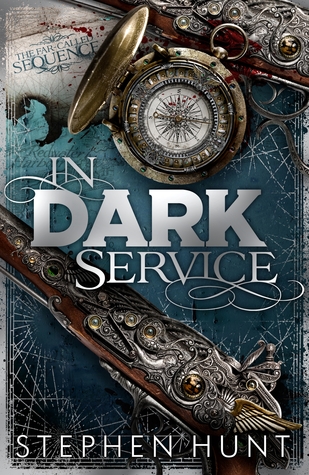 Author interview with Stephen Hunt
Author interview with Stephen HuntAuthor bio:
------------------------------------------------------------
Hi
Stephen, welcome over at The Book Plank and for taking your time to answer
these few questions for us.
BP:
First off, could you give us a short introduction as to who Stephen Hunt is?
What are your hobbies, likes and dislikes?
SH: To
be honest, I’m fairly interchangeable with any of the cast of The Big Bang
Theory – comic-books, reading genre fiction, computer programming, RPG games,
even model railways and painting Warhammer figures. I’m a walking stereotype,
basically.
BP: You
have been writing for many years, writing short stories and the Jackelian
series. Do you still know the moment when and where you decided to that you
wanted to become a full time author?
SH: I started out writing reviews for game
magazines back in the late eighties. That fired my interest in writing and got
me interested in short fiction, and from there, full-blown novels were only a
hop, skip and jump away.
BP: The
Jackelian series was very well received, did you gain by writing this series
valuable experience that you were able to use when you created your new series
Far-called, of which the first book, In Dark Service will be released this May?
SH: I’d
be willing to bet that most authors get a book behind them and think their next
novel is going to be even better . . . a more refined work than the last - that
their greatest book always lies in front of them. Hopefully I’ll keep on
feeling like that until I peg out. I’d like to go like Jack Williamson, still
writing well into my nineties.
BP: If
you would have to sell In Dark Service with a single sentence how would it go?
SH: A father on a mission to save his son, and a
son on a mission to stay alive as a slave with his friends.
BP:
Jackelian ran for 6 volumes, in the announcement of In Dark Service it is
mentioned that it is set in a non-Jackelian world. Was it hard for you to part
with Jackelian and create a completely new atmosphere?
SH:
After six books, I think I was ready for a change. Authors should always be
willing to experiment. The alternative is getting stale.
BP: What
was for you the hardest part when you were writing In Dark Service?
SH: The
hardest part is usually starting out for me. It feels like you’re staring up a
mountain slope with a boulder in front of you that needs rolling. You push and
push, and then it starts slowly moving.
BP:
Besides the hardest part in writing, which chapter or scene did you enjoy
writing about the most?
SH: I
usually try to stick a BBB at the end (bloody big battle). They’re always the
greatest fun to write.
BP: In
Dark Service is the first book in a completely new fantasy series called:
Far-called, can you tell us a bit more about what this series is about?
SH: It’s
about two families – the Carnehans and Landors - stuck in the nub-end of a
backward, rural kingdom. Slavers strike the town they live in and carry away
all the youngsters to sell. The town mounts a rescue expedition, hampered by
the fact that the world, Pellas, is an amazingly large one, and their lost
people could be anywhere in it. Those taken have to survive as slaves in a
hellish environment. Those in the rescue expedition face their own kind of hell
as they track down the missing.
BP: The
first book in the Far-called series is set to be released this May, if you were
given the chance to retract your book from publishing and make one final change
would you do so? If yes, which part and why?
SH: I
would probably resist such a temptation. I might look at how the characters
have developed over the later novels and retrofit a few small changes in to
accommodate what I know now, I guess.
BP: have
you already mapped out how many volumes the Far-called series will run?
SH: At
least two more. After that, we’ll see.
BP: DO
you still have any other projects besides Far-called that you would like to pursue
in the near future?
SH: I’m
currently writing a short story set in another author’s world as part of an
anthology. It’s the first time I’ve done something like that – more for fun
than anything else, It has to be said.
BP:
everyone enjoys science fiction and fantasy in their own way, what do you like
most about reading and writing it?
SH: I
just want to say one word to you, Benjamin, just one word: plastics. No, actually it would have to be: IMAGINATION. If I’m not
receiving it in a novel I’m reading, or generating it in one I’m writing, I’m
on the wrong track.
BP: and
just lastly, if you would have to give your top five favourite books, which
would they be?
SH: For
SFF they would be (1) The Legion of
Space by Jack Williamson (2) First
Lensman by E.E. Doc Smith (3) Neuromancer by William Gibson (4) The Return of
the King by J.R.R. Tolkien (5) Legend by David Gemmell. I’d have a different
list for crime, thrillers, historicals, literary fiction and the other genres I
read.
BP:
Thank you very much for your time Stephen and good luck with your future
writing projects!

Comments
Post a Comment